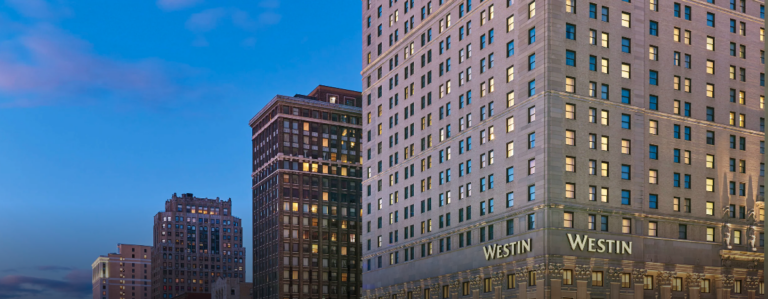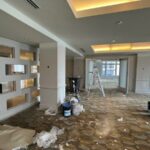
- Kim Kisner
- Business
- 09/26/2023
Westin Book Cadillac Focuses Include Lighting, Recycling, and Food Waste

The Westin Book Cadillac Detroit, a historic 31-story hotel on Washington Boulevard, executed a $20 million makeover this year, and sustainability was part of the plan.
The hotel first opened nearly a hundred years ago in 1924 and had several owners before closing in the 1980s. It was reopened in October 2008 after a $200 million restoration. It is managed by Marriott International.
SBN Detroit spoke with Scott Stinebaugh, director of sales and marketing, The Westin Book Cadillac, to learn more about how sustainability has played a part in the renovation.
Q: Talk to me a bit about your sustainability approach.
A: For a long time, I think we were not doing as much as we could have been. And then we were hit with COVID and all things came to a grinding halt.

As we started looking to renovate the building, that presented many opportunities to improve on what we had been doing.
The hotel is just emerging from a $20 million renovation. Looking back to 2008 when we reopened after a full-scale $200 million restoration, we had state-of-the-art HVAC, water flow, and energy equipment at that time, and now fifteen years later, it’s time to improve the infrastructure and systems. And we’ve done that.
Q: What are some examples you can point to?
A: We’ve upgraded the 453 guest rooms and public areas to 100% LED lights. We replaced 1,500 four-foot fluorescent tubes with LED lighting, and 330 75-watt halogen bulbs have been converted.
All of the guest rooms had individual heat pumps so that was a good start, but we upgraded the public area HVAC system to a system that has a sensor and uses outside air when the conditions are right to cool the building.
Another part of the renovation was converting 75% of the tubs in the guest rooms to stand-up showers (which can save water).
We donated as much of the furniture as we could to divert it from landfills. Habitat for Humanity took as much as possible, and the rest went to liquidators who used third parties to reuse the furniture.
We now recycle all cardboard, bottles, and cans and have them picked up weekly.
From a food waste standpoint, we work with Metro Food Rescue. We call them when we have extra untouched food and they come pick it up within an hour and distribute it to people in need.

We are also working with Make Food Not Waste to get certified through their PLEDGE program focused on reducing wasted food.
In meeting rooms, we now have water bubblers versus serving water in pitchers and we converted from plastic water bottles to box water.
In line with our brand, Westin has a new initiative called The Well in which guests can get complimentary water in the lobby and refill the throughout their stay. We sell glass bottles that guests can use also. We are among the first Westin hotels to launch this.
Q: Do your guests ask about your sustainability practices?
A: Yes. We get a lot of questions about our sustainability practices. We know this is part of the decision-making when people are choosing venues for events. It’s happening more and more, which I think is great.
Q: What are the biggest challenges?

A: Being consistent. Sometimes we get so busy in an operation like this. We are a $40 million annual revenue entity, and the work can seem endless. It’s about not getting lazy and staying consistent. Because it’s easier to throw that piece of waste in a place where it does not belong versus recycling. It’s easier to throw food away versus calling for a pickup. It takes focus, time, and accountability and that, I think, is our biggest challenge.
Q: How do you keep staff accountable?
A: We have weekly goals in every department that we call WIG (Wildly Important Goals). These are important goals that we put into a measuring platform every week, and sustainability goals are a part of this.
There are small and large things in each department that, combined, make a difference.
Q: What are the biggest opportunities?
A: I think there are more things we can do in all areas of the hotel and also the ongoing education of the staff. Making sure when staff turns over that our sustainability commitment and practices are ingrained in new employees so that our efforts are not weakened or broken is critical.
It’s important to keep that fire going.
Q: Do you find your staff to be enthusiastic about the sustainability efforts?
A: Yes. I think they are excited about making a difference. I see it in the commitment they have to follow and work through the processes that are in place. And the overall commitment here comes from the top down as well.

Q: How do you think your efforts might influence businesses in Southeast Michigan?
A: We all need to be good corporate citizens and responsible to the earth. I think when others witness our efforts and the efforts of those around them, that can be contagious. I hope so.
Q: What are you most proud of when it comes to the practices you’ve implemented?
A: The metro food rescue. I’m a day one employee in this hotel. Over the years, I’ve seen a lot of food waste. Food that is untouched going into the trash. Putting a stop to that and being able to give perfectly good foot to those in need is huge. And imagine if everyone did that.
Be sure to subscribe to our newsletter for regular updates on sustainable business practices in and around Detroit.
Kim Kisner
- All
- Business
- Community
- Education
- Events

Unique Monique Scented Candles, a Detroit-based business founded by Monique Bounds., aims to produce candles and household products with clean ingredients and local supply chains. What began as a personal hobby during college has evolved into a full-time venture producing coconut oil and soy-based candles made with essential oils and locally sourced materials. SBN Detroit interviewed Bounds about launching a sustainable product line, sourcing challenges in Michigan, and...

Eastern Market Partnership, in collaboration with the City of Detroit’s Office of Sustainability Urban Agriculture Division, has announced $240,000 in grant funding to support Detroit-based farmers and farmer collectives. The grants will advance food access, climate education, sustainable land use, and economic opportunity, with priority given to Black- and Indigenous-led farms, youth-led initiatives, and projects rooted in historically disinvested neighborhoods. The recipients – ranging from cooperatives and community...

Citizen Robotics is a Detroit-based nonprofit that advances the use of robotics and digital manufacturing in residential construction, focusing on improving productivity, sustainability, and long-term affordability. Best known for its early work in 3D-printed housing, it explores how alternative construction methods and new financial models can reduce material waste, lower lifetime operating costs, and enhance the resilience of homes. SBN Detroit interviewed Tom Woodman, founder and president of...







